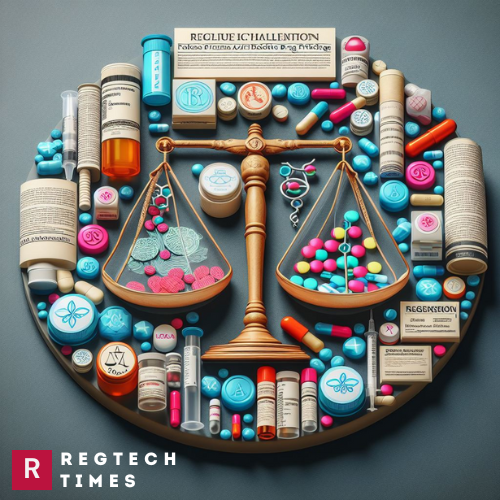The United States has filed a complaint under the False Claims Act (FCA) against Regeneron Pharmaceuticals Inc. (Regeneron), a well-known pharmaceutical company with headquarters in New York. Regeneron is known for producing and distributing Eylea, a potent anti-vascular endothelial growth factor inhibitor. The Food and Drug Administration (FDA) has approved Eylea for a variety of medical purposes, most notably the treatment of neovascular age-related macular degeneration. This degenerative disorder, which is frequently connected with advancing age, offers a serious threat to eyesight and remains a major worry among the elderly.
Introduction to False Claims Act
The False Claims Act (FCA), commonly known as the “Lincoln Law,” is a federal legislation in the United States that holds individuals and businesses liable for defrauding government programmes. It is intended to combat government fraud by permitting whistleblowers, known as “relators,” to sue on the government’s behalf, citing bogus claims for government cash and property.
Individuals or businesses may be held accountable under the False Claims Act if they deliberately submit false claims or make misleading assertions in order to collect government payments. This includes submitting fraudulent invoices, manipulating records, or engaging in other dishonest actions in order to receive government payments.
The False Claims Act encourages whistleblowers to come forward by offering them a percentage of the government’s monetary recovery as a consequence of their litigation. Furthermore, the False Claims Act imposes hefty financial penalties on anybody proven to have committed fraud against the government.
The False Claims Act has helped the government recover billions of dollars and prevent fraud in a variety of industries, including healthcare, defence contracting, and financial services.
Regeneron Faces Allegations of Deceptive Medicare Pricing
The complaint alleges that Regeneron engaged in deceptive methods to inflate Medicare reimbursement rates for their medicine Eylea. This fraud involved deliberately submitting fake average sales price reports to the Centers for Medicare and Medicaid Services (CMS), which omitted critical price concessions. The United States claims that Regeneron intentionally misrepresented price concessions related to credit card processing fees paid to specialty medication wholesalers in order to benefit its customers.
According to the allegations, Regeneron failed to report these credit card processing costs in its filings, despite deliberately paying them to encourage specialty pharma distributors to accept credit card payments for Eylea while still offering the drug at a discounted cash price. This method supposedly allows Regeneron’s customers, especially retina and ophthalmology offices, to take advantage of credit card perks such as “cash back” and other rewards while allowing Eylea to maintain a reduced cash price.
Principal Deputy Attorney General Brian M. Boynton, who leads the Justice Department’s Civil Division, emphasised the government’s position on such misbehaviour, saying, “We will not allow pharmaceutical companies to violate price reporting requirements in order to maintain high drug prices.” He emphasised the department’s commitment to protecting federal healthcare programmes from unlawful acts by pharmaceutical companies or other entities that unfairly inflate costs, so burdening taxpayers.
Government Accuses Regeneron of Withholding Price Concessions, Inflating Medicare Costs
“The government accuses Regeneron of manipulating Medicare’s drug pricing system by knowingly withholding the disclosure of credit card processing fees as price concessions to its customers,” stated Acting US Attorney Joshua S. Levy for the District of Massachusetts. “This omission significantly increased the drug’s costs to Medicare over time, boosting Regeneron’s revenues.” False reporting of average sales prices has cost the Medicare system hundreds of millions of dollars, and we are committed to put an end to such abuses.
The action was initially filed under the False Claims Act’s qui tam, or whistleblower, provisions. These laws allow private individuals to pursue proceedings on behalf of the United States and get a part of any cash recoveries. In this case, the United States chose to intervene and take over the action. If the defendant is found guilty under the FCA, the United States may seek to recover three times its damages plus appropriate penalties.
Conclusion
The case is being managed collaboratively by the Justice Department’s Civil Division, Commercial Litigation Branch, Fraud Section, the U.S. Attorney’s Office for the District of Massachusetts, and the Department of Health and Human Services (HHS) Office of Inspector General, with cooperation from the FBI. The case is named United States ex rel. Does 1-2 et al. v. Regeneron Pharmaceuticals, Inc. et al., No. 20-cv-1401-PBS.
The proceedings are being led by Trial Attorneys Douglas Rosenthal, Asha Natarajan, and Samuel R. Lehman of the Justice Department’s Civil Division, as well as Assistant United States Attorneys Diane Seol and Lindsey Ross representing the District of Massachusetts.
This investigation and prosecution demonstrate the government’s unwavering commitment to combatting healthcare fraud, using the False Claims Act (FCA) as a powerful instrument. Anyone with information on potential fraud, waste, abuse, or mismanagement can contact HHS at 800-HHS-TIPS (800-447-8477).
It is critical to understand that the claims presented in the lawsuit are allegations and do not suggest that liability has been established.


